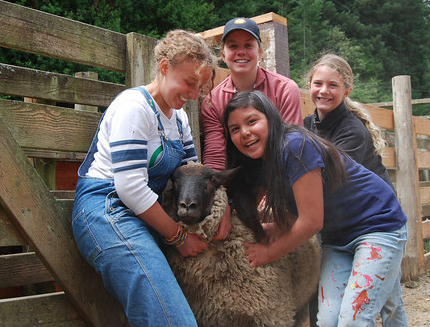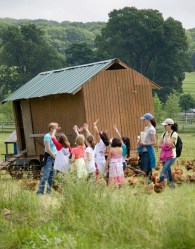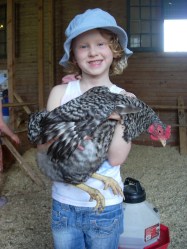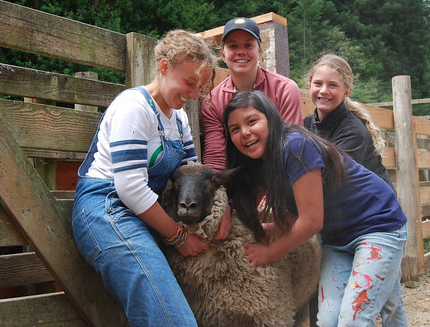
At Plantation Farm Camp in Sonoma County, Calif., kids help with farm chores alongside traditional camp activities.
Ah, summer camp. Hiking, canoeing, and capture-the-flag, followed by meals of beans and franks or overcooked spaghetti — it’s the stuff childhood memories are made of. But at some camps around the country, weeding, composting, and looking after livestock supplement the usual arts, crafts, and games, and dinner is braised lamb shank, polenta, and grilled vegetables.
Every year, parents sink thousands of dollars into intensive music, sports, or academic summer programs in the hopes of sculpting their children into perfect Ivy League candidates. Farm-based summer camps offer specialization of a different stripe, getting kids outside and down in the dirt to experience the meaning of “farm to table” firsthand — and perhaps cultivating a few future farmers in the process.
“It seems to fill a need people see in their kids’ education,” says Meghan Ryan, education programs manager at Stone Barns Center for Food and Agriculture in Pocantico Hills, N.Y. “Kids are so scheduled, but this is something very different and special.”
Stone Barns, a nonprofit, year-round working farm, offers weeklong day camps throughout the summer for first through eighth graders, who help the farmers with whatever they need — harvesting garlic and raspberries, taking care of animals, weeding, etc. Campers also get a chance to cook with freshly picked ingredients in the kitchen of Blue Hill, the farm’s high-profile onsite restaurant. Some campers arrive already familiar with gardens and farmers markets, but even for those who don’t, Ryan says, the excitement of being outside, working with real farmers, makes farm chores as engaging as any traditional camp activity. “[The kids] jump right in,” she says. “They want to stick their whole arm in the compost pile. It’s an easy sell.”

Kids visit an “eggmobile,” or mobile henhouse, at Stone Barns. (Photo by Mark Jordan.)
Stone Barns took a lot of inspiration from Shelburne Farms in Vermont, another nonprofit farm that has hosted summer camps since 1972, long before people started throwing around the phrase “farm to table.” Megan Camp (her real name), the program director and a 30-year employee there, says, “Being outdoors is a wonderful and healthy part of a child’s development, which is why there’s always been strong interest in summer camps. But what we’ve seen is this high-level interest, especially in the last decade, in farm-based experiences. It’s grown exponentially.”
Ryan agrees. She says that in the three years she’s worked at Stone Barns, she’s begun to see “parents with a much greater awareness of [food] issues. There’s this sense that they want their kids to reconnect.”
Being engaged in the day-to-day life of a working farm opens kids’ minds to the idea of food being part of a much larger system, and Ryan says parents report seeing evidence of this awareness, as kids become interested in composting, cooking, and healthy eating. “We try to make these concepts feel very accessible because we believe they are,” she says. “Eating seasonally and locally become part of the rhythm of their young lives.”
“Kids will love kale if they have a chance to plant it and harvest it and cook it,” Camp says. “A lot of the kids might not grow up to be farmers, but they’re going to better understand what’s involved in a healthy food system.”
At Butter Beans Food and Garden Camp in Brooklyn, campers learn the same lessons about sustainable eating, but in an urban context, with visits to rooftop farms, urban gardens, and farmers markets as well as lessons in cooking, pickling, and jam-making (did I mention it’s in Brooklyn?). “We want to give [kids] hands-on experience in all parts of the food process,” says Elana Karp, the camp director. Each two-week session has a different focus — growing food, producing food, preserving it, etc. — but Karp says she tries to incorporate the entire seed-to-table journey in every session.

A camper gets in touch with nature at Shelburne Farms in Vermont.
For those with fond memories of their own days at a more traditional camp, take note that farm education and traditional camp activities don’t have to be mutually exclusive. Plantation Farm Camp, a sleepaway camp in Sonoma County, Calif., has a 60-year history of blending the two. Campers there do farm chores twice a day — in addition to all the traditional hiking, swimming, and crafts — and meals are prepared with ingredients grown on the farm (cue lamb shank). Kelly Marston, who directs Plantation Farm with her husband, echoes the others’ sense that parents are zeroing in on the importance of food education. “There are parents taking a lot of care with what their kids eat,” Marston says. “To send them to a summer camp where they’re eating hot dogs and pre-cooked hamburgers doesn’t really mesh with their values.”
Despite the increased interest, Marston also still sees a huge range in the kids’ experience and knowledge. Ninety miles from the Bay Area, Plantation gets some kids from San Francisco foodie families that keep bees, and others “who are surprised that carrots grow in the ground.”
Living on a farm for three and a half weeks, the kids are truly immersed. By helping out with the actual work of the farm, Marston says, campers learn to be more conscientious. They learn that “chores are not just cleaning up your room. It’s taking care of an animal that needs you. Even if you’re 9 or 10, the work you’re doing is important.”
The animals at Plantation, Stone Barns, and Shelburne are raised to be eaten, which leads to some intense self-searching among campers, whether or not they decide to take part in that particular lesson. “It is a very emotional thing, and we have to have a big conversation about it,” says Peter Bullock, one of the camp directors at Shelburne, of the day when older campers select sheep for slaughter. “We have [campers] come together and discuss why they did or didn’t participate. We get some of the most amazing reflections I’ve heard.”
While these discussions also help kids understand that most meat isn’t raised the way it is on these farms, the camp directors all emphasize that they’re not trying to indoctrinate campers into one way of thinking about food. “We’re much more about highlighting what we’re doing instead of denigrating anything else,” Ryan says.
Bullock echoes this sentiment when he says: “We’re looking to have this be a self-discovery.”



